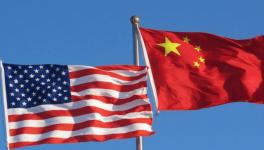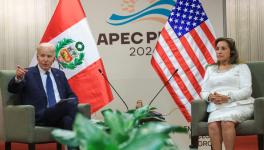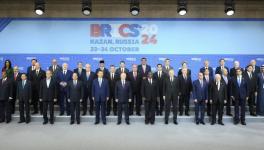Some Misconceptions About ‘Non-Imperialist’ Scandinavian Capitalism
Representational use only.Image Courtesy: Shutterstock
There are many misconceptions about Scandinavian capitalism. A very common one is the belief that since the Scandinavian countries developed vigorous capitalist economies, without ever having acquired any colonies of their own, they constitute a clear refutation of the claim that capitalist development necessarily requires imperialism. This is an argument that I have heard for decades, but it is based on a misconception, not just about Scandinavia but, above all, about imperialism itself.
Indeed, one may say many positive things about the concessions wrung out of capitalism by Scandinavian social democracy (although many of these are under threat in the current epoch of neo-liberalism), but it represents a complete misreading of capitalism to say that Scandinavia constitutes an example of non-imperialist capitalism.
The Scandinavian countries themselves may not have had colonies, but they rode piggy-back on the imperialism of other powers whether before or after the Second World War. Let us look at the imperialist arrangement in some detail.
Each successful capitalist country does not need to have an empire of its own. There is an overall imperial system within which capitalist development occurs and different advanced capitalist countries are beneficiaries of this system, even when they do not have any empires of their own.
In the heyday of British imperialism, for instance, the British market was open to goods from continental Europe. The latter did not have to find exclusive markets of its own because it could freely enter the British market to sell its wares. And it succeeded in doing so because Britain’s “early start” meant that its labour productivity was lower than in the new industrialisers and hence (with more or less equal money wages) its unit cost of production higher.
Likewise the primary commodities extracted by British imperialism from its colonies and semi-colonies could be accessed by continental Europe and other newly-developing capitalist countries of that time, without the latter having to make their own exclusive arrangements for obtaining such supplies.
Indeed, this is a role that all leading imperialist countries fulfil at any time: it is an essential component of their leadership role, which permits the diffusion of capitalism to rival countries and hence does not provoke any serious challenge to their leadership on the part of the new industrialisers.
The “leaders” actually absorb goods from rival powers engaged in developing their own industrial capitalisms, and avoid getting into unsustainable current account deficits owing precisely to the imperial arrangement. Britain avoided such unsustainable deficits by the “drain” it imposed on its colonies whose magnitude was large enough not just to cover this deficit but even to make substantial capital exports to the very countries with which it had such deficits, namely, the temperate countries of European settlement.
The United States, which succeeded Britain as the leader of the capitalist world, lacked colonial possessions of the sort that Britain had. But, it managed its current account deficit by printing dollars, which under the Bretton Woods system were decreed to be “as good as gold” (being convertible to gold at $35 per ounce of gold). Even subsequently, after the collapse of the Bretton Woods arrangement and of gold convertibility, dollars have been accepted de facto as being as good as gold by the world’s wealth-holders, who have no hesitation in holding on to them.
The entire capitalist world, in short, is invited to ride piggy-back on its shoulders by the leading capitalist country. True, some advanced countries may find this too limiting and attempt to carve out empires of their own, but those that do not, such as the Scandinavian countries, cannot be deemed to be building their own capitalism without any recourse to imperialism: they access the benefits of the imperialism of the leading capitalist power.
There are two additional points to be noted here. First, the emerging rival capitalist powers enjoy free access to the market of the leading capitalist country, even as they themselves impose tariffs in their own markets against imports, including from the latter. Thus, Germany and the US imposed tariffs in the pre-First World War period to cordon off their national markets for their own capitals, even while encroaching on the British market.
It is this asymmetry which allowed them to industrialise despite the head start that Britain had got. The same is true of other countries of continental Europe. Second, these rival powers not only had access to the British market, but to the markets of the British colonies as well, at least until the 1920s and 1930s.
The introduction of “imperial preference” in the inter-war period, which entailed differential tariffs, that is, higher tariffs against goods produced outside of the British empire compared with goods produced within the British empire, marked a break in this arrangement. It was designed primarily against the massive Japanese drive to capture the markets of Britain’s Asian colonies.
But, even though Japan was the main target of “imperial preference” and the later “Buy Empire” campaign, differential tariffs meant a general change in the imperialist system, and were both a cause and a symptom of the inter-imperialist rivalry that got triggered by the Great Depression.
But, in the entire period before this break, that is, before the Japanese economic expansionism that upset the pre-First World War arrangement, and that transformed itself, when thwarted by these defensive actions of Britain, into Japanese military expansionism, the British colonial markets were open to goods not just from Britain but from rival capitalist powers.
Thus, the development of Scandinavian capitalism despite the fact that Scandinavian countries did not have colonies of their own, is not a refutation of the necessity of imperialism for the growth of capitalism. It only underscores the complexity of the imperial arrangement.
It follows from this that the Scandinavian countries have as much interest in preserving the imperial arrangement as any other major capitalist country. This is not just for political reasons, namely that a collapse of the imperial “security” arrangement makes the survival of capitalism in any particular advanced country that much more difficult, by encouraging its political encirclement. It is also an economic necessity, for ensuring the availability of a whole range of tropical and semi-tropical goods that are not producible in the capitalist metropolis, whose supplies would get disrupted with a weakening of the imperial arrangement.
Many have been surprised recently by the decision of Sweden and Finland to apply for NATO (North Atlantic Treaty Organisation) membership, and their reported willingness to enter into an agreement with Turkey to overcome the latter’s objection to their membership, according to which they would withdraw protection to Kurdish political refugees, whom the Turkish government wants to persecute.
No doubt, Russia’s war with Ukraine has provided the immediate background against which they have expressed their wish to join NATO, but their change of stance is indicative of something deeper, namely, a basic shift that is taking place in the capitalist world.
The argument advanced by imperialism to explain their changed stance stresses the threat posed by “Russian expansionism”; but this argument does not stand scrutiny. Even assuming that Russia is hell-bent on being “expansionist”, its “expansionism” has hitherto been assumed to cover the territories that were once a part of the Soviet Union, but neither Sweden nor Finland fall into that category.
What is more, at the height of the Cold War, when European powers were crying hoarse over the bogey of a Soviet threat, and European peoples were being daily bombarded by anti-Sovietism, these countries had remained aloof from NATO. Why then should they suddenly apply for NATO membership now, when the Soviet Union has collapsed, and when the ideological challenge to imperialist hegemony has receded?
The answer lies in the fact that Western imperialism is imploding under the impact of the protracted crisis that neo-liberalism has entered into. Being afflicted by a protracted crisis is not conducive to the exercise of hegemony.
The world appears to be on the cusp of a change that the Western powers are desperately trying to prevent by taking an ultra-aggressive stance. It is a fear of this possible imminent change, with the decline of western hegemony and the emergence of China and Russia as alternative centres of power that is binding the Western countries together as never before, including even the Scandinavian countries.
The change in the stance of the Scandinavian countries therefore, far from exhibiting Russia’s ultra-aggressiveness, is symptomatic of Western powers’ ultra-aggressiveness in a situation where their hegemony is being threatened because of their being engulfed in a protracted economic crisis.
Get the latest reports & analysis with people's perspective on Protests, movements & deep analytical videos, discussions of the current affairs in your Telegram app. Subscribe to NewsClick's Telegram channel & get Real-Time updates on stories, as they get published on our website.























